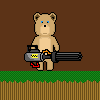Do I learn the skills I need then make the game, or do I work on the game, and learn the skills along the way?
http://msdn.microsoft.com/en-us/library/aa288436(v=vs.71).aspx
Also, see my post here: http://www.gamedev.net/topic/639627-best-way-to-learn-game-programming/
You do not have to memorize anything. When you need something, it's there to look up.
SlateBoard, my friend, what is missing is the confidence to just have a go at making a game. The best thing you can do right now is learn how to draw a bitmap to the screen, display some text and obtain some cursor key input. If making a game is a tall order then just start with a simple demo of a character walking around an environment(2D, 3D whatever).
Give things a shot. Do it how you think it can be done - even if you are not sure its the "correct" way to do it. You WILL make mistakes along the way, but the main thing is that you just do it.
So far though my prob is memorizing long lines of code though so I plan on spending more time practicing things I need.
As far as memorization goes, there are a few keywords you need to know, and It is good to get a nice knowledge of the SDK or whatever you're using, but when you really feel confident as a programmer is when you understand how each line of code works, what it does, and how you can change its arguments to make it work differently. I never really liked mushing other people's code together, because it usually turns into a big soupy mess and doesn't teach you as much as you had maybe hoped about programming. You can look at other people's code for reference or for ideas, but it really helps to type out each line, think about it, and get a really clean knowledge of how everything works together. That way, when you want to program something from "scratch", you feel like you know how to implement each feature.
When a problem comes across in your code(such as simple collision detection), before reaching for a book or looking on Google, try to see how far you can get solving the problem by yourself. Doing that as much as you can will definitely slow down your project, but will make you a more confident coder in the long run. Many problems in programming aren't really about knowing what "word" or "command" in the language to use, but about a good understanding of mathematics and logic.
Both ways "could" lead to the same place but my own experience (through hurt as daaark put it) has got me going back to getting the language and paradigm down over blustering through a game.
So "along" with doing the gameinstitute courses i am religiously following these resources.
http://see.stanford.edu/see/lecturelist.aspx?coll=11f4f422-5670-4b4c-889c-008262e09e4e
http://see.stanford.edu/see/courseinfo.aspx?coll=2d712634-2bf1-4b55-9a3a-ca9d470755ee
fwiw
b
Start by making a simple game such as a Tetris or Pong clone. This way you will have a much better understanding of how to go about making a more complex game.
For a more detailed account of why making a Pong clone is a good idea as your first game, you can read this post of mine
[entry='2254511']Why Make Pong[/entry]
From experience, it's surprisely a combination of both!
For example: you will learn the skill to set up the game canvas and adding your game components to the game canvas to put together your game.
Even the simple game like an arcade shooter clone in Java will make you recall all the basic intuitive math! Even classical physics kinematics equations allow you to make your game super smooth! Everything you learned from your introduction to Java programming are all important. Do not neglect learning any of the concepts. They all at some point will play a role. (ArrayLists are super useful so you don't need to keep track of the size of the arraylist yourself!) (Rectangle objects are super useful for basic collision detection between your game objects)
A programming language like Java is huge in the functionality it has to offer. Even I am constantly learning new classes in the Java API to make me more productive in my game project.
Honestly, when I learned game programming. It took me a month(on and off) to make sure all the basic meat of the game was there(bgm, sound effects, collision detection, life bar) and also everything was bug-free. A month of time getting everything to be bug-free was one of the happiest thing I did in my life.
Also, please get started! This is the only way to test your skills of what you know and what you don't know. Reading books alone will only get you so far. So you actually have to do a bit of reading and start applying the knowledge immediately of what you read.
I agree, start small. I heard people constantly want to make the next-big thing but end up giving up because it did not meet their expectations. Think of the game project as a hobby that makes you want to learn, make you curious and make you think as a human being. Just start off putting a game window on the screen and then start adding game objects. If you don't know or understand something ask, there are talented and smart people on this forum willing to help. Just be sure to post what you have done so we can better assist your problem.
Please bear in mind, don't be put off by the complexity of game programming. There will be things you will need to research to help guide you to your solution. Struggle with the coding and you will find programming to be very elegant.
I was wondering the same thing! I no what kind of game I want to make but I'm not sure If I should learn as I go or strap down and learn things I dont even intend on using. So far though my prob is memorizing long lines of code though so I plan on spending more time practicing things I need.
Things you think you don't intend on using are the things you are neglecting to learn. You will be sorry when that thing makes your life easier programming the game. These things are built by programmers and for people using them because it works and saves you time. Why would you neglect learning it? It makes no sense.
You're not suppose to memorize code. That is pointless and a waste of brain cells. You are suppose to understand the principles, concepts and ideas behind what the code is saying. Treat programming like a story and you will say "Hey this code was well-written and I actually got something out of it!" Programming is not a memory game.






